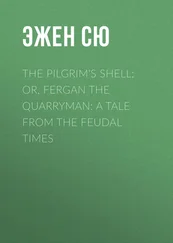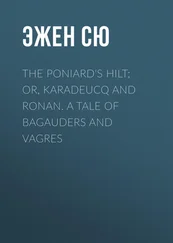Эжен Сю - The Pocket Bible; or, Christian the Printer - A Tale of the Sixteenth Century
Здесь есть возможность читать онлайн «Эжен Сю - The Pocket Bible; or, Christian the Printer - A Tale of the Sixteenth Century» — ознакомительный отрывок электронной книги совершенно бесплатно, а после прочтения отрывка купить полную версию. В некоторых случаях можно слушать аудио, скачать через торрент в формате fb2 и присутствует краткое содержание. Жанр: literature_19, foreign_antique, foreign_prose, на английском языке. Описание произведения, (предисловие) а так же отзывы посетителей доступны на портале библиотеки ЛибКат.
- Название:The Pocket Bible; or, Christian the Printer: A Tale of the Sixteenth Century
- Автор:
- Жанр:
- Год:неизвестен
- ISBN:нет данных
- Рейтинг книги:3 / 5. Голосов: 1
-
Избранное:Добавить в избранное
- Отзывы:
-
Ваша оценка:
- 60
- 1
- 2
- 3
- 4
- 5
The Pocket Bible; or, Christian the Printer: A Tale of the Sixteenth Century: краткое содержание, описание и аннотация
Предлагаем к чтению аннотацию, описание, краткое содержание или предисловие (зависит от того, что написал сам автор книги «The Pocket Bible; or, Christian the Printer: A Tale of the Sixteenth Century»). Если вы не нашли необходимую информацию о книге — напишите в комментариях, мы постараемся отыскать её.
The Pocket Bible; or, Christian the Printer: A Tale of the Sixteenth Century — читать онлайн ознакомительный отрывок
Ниже представлен текст книги, разбитый по страницам. Система сохранения места последней прочитанной страницы, позволяет с удобством читать онлайн бесплатно книгу «The Pocket Bible; or, Christian the Printer: A Tale of the Sixteenth Century», без необходимости каждый раз заново искать на чём Вы остановились. Поставьте закладку, и сможете в любой момент перейти на страницу, на которой закончили чтение.
Интервал:
Закладка:
Slightly recovered from her own fright, Mary La Catelle drew nearer to the monk with deepening interest. The Franc-Taupin looked around and said to Christian:
"What has become of your guest? Did he show the white feather? I would have preferred he were a braver man."
"No, no, Josephin. Our guest left the house shortly before the disturbance on the street; he feared it was growing too late for him."
"Why did he not wait for me? I would have escorted him home safely after emptying our pot of Argenteuil. But, coming to think of it," the Franc-Taupin broke off, while he left Christian to hold up the head of the friar, "I shall pour a few drops of wine down the wounded man's throat; the devil! wine has the miraculous power of being as helpful to the sick as to the well;" and taking up the pot he approached it to his own lips. "Before administering the potion to others let me try it myself – it is the duty of all prudent pharmacists to assure themselves of the quality of their own medicine."
While the Franc-Taupin was thoroughly "trying" the beverage, Bridget came down again with her daughter. The latter had hastily put on her clothes. Her brother also, whom the noise had awakened, dressed himself and came out of his room. Hervé was on the point of inquiring from his father what was the cause of the commotion in the house when his eyes alighted upon St. Ernest-Martyr, and he recognized the man whom his sister Hena had ingenuously called "her monk." A flash of lightning shot from Hervé's eyes and for an instant his looks assumed a ferocious expression. The lad, however, controlled his sentiments and closely watched his sister and the friar, to the latter of whom the Franc-Taupin was administering a few mouthfuls of the comforting wine. Speedily recalled to himself by the strengthening elixir, Brother St. Ernest-Martyr opened his eyes. Before him he saw, like a celestial apparition, the angelic countenance of Hena, who, with eyes moist with pity, held out to her uncle with a trembling hand the lint that he was using to dress the wound of the monk whose head Christian held in his hands. When he had completely regained consciousness and collected his thoughts, the monk became aware of the solicitude with which he was surrounded by the family that had taken him in; tears of gratitude and tenderness welled up in his eyes and rolled down his face, which, pale with the loss of blood, recalled the touching beauty that painters impart to the image of Christ. The expression of ineffable gratitude on the monk's countenance gave it at the moment so sweet a charm that Hervé trembled with suppressed rage. His anger was such that it even threatened to break out when he surprised the eyes of the monk and of his sister once as they accidentally met. The lad noticed that both dropped their eyes and seemed embarrassed. These circumstances escaped all the other members of the family. Brother St. Ernest-Martyr turned his head towards Christian and said to him in a feeble voice:
"It is to you, no doubt, monsieur, that I owe my life. And yet I am a stranger to you. May heaven place it some day in my power to attest to you the gratitude with which I am penetrated. I thank you for your help."
"Brother," answered the artisan, "I would have fulfilled my duty as a Christian by assisting you even if you were a stranger to me; but often did our mutual friend Mary La Catelle speak to us of you and of the esteem that you deserve. Besides, my wife often was present when you were teaching the little ones. She has preserved cherished recollections of the evangelical morality that you preached to them."
"Oh, we could never sufficiently praise the good brother!" exclaimed Mary La Catelle. "What is known of him is like nothing beside the numerous acts of charity that he practices in secret – "
"Sister, sister," said the monk, blushing with modesty and interrupting the widow, "do not exaggerate my poor deserts; I love little ones; to instruct them is a pleasure to me and their affection more than rewards me for the little that I do for them. My duty squares with my pleasure."
"Well, brother, I shall say no more," replied Mary La Catelle; "I shall not say how highly I think of you, and how I but re-echo the sentiments of all who know you; I shall say nothing of how, a short time ago, you rushed to my defense at the risk of your life; I shall not say how, only yesterday, a man who fell into the river near the isle of Notre Dame was being carried down stream and about to sink when you threw yourself – "
"Dear sister," insisted Brother St. Ernest-Martyr with a melancholy smile, and again interrupting the widow whose praises of the monk placed Hervé upon the rack, "your style of not saying things is too transparent. Oblige me; draw a veil over the acts that you refer to; anyone else would have done as much. We all in this world owe assistance to our fellows." As the young monk spoke these words, his eyes involuntarily again encountered Hena's; he sought to flee from their influence upon him; he rose from his stool, and said to Christian: "Adieu, monsieur; I am only a poor friar of the Order of St. Augustine; I can only preserve the deepest gratitude for your timely help. Believe me, the remembrance of yourself and of your sympathetic family will always be present in my mind. May the blessing of God rest upon your house."
"What, brother," interposed the artisan, "your wound is barely dressed, and you would leave the house so soon? Rest yourself a little longer; you are still too weak to proceed on your route."
"It is late, and I feel quite strong enough to return to my convent. I went with the Superior's consent to carry some consolation to a good old priest of Notre Dame who lies dangerously ill. Night is now far advanced, allow me to withdraw. I think that the fresh air will do me good," and respectfully bowing to Hena and her mother, blushingly he said to Mary La Catelle: "To-morrow will be school day, dear sister; I hope I shall be able to go to your house as usual, and give the children their lessons."
"May it please God that you can keep your promise, dear brother," answered the young widow; "but I am less courageous than you; I would not dare to return home to-night any more; I shall request Bridget to be so kind as to afford me asylum for the night."
"Do you imagine, dear Mary, that I would have allowed you to go?" answered Christian's wife. "You shall share Hena's bed."
After the monk's wound was dressed, the Franc-Taupin had remained silent, sharing, as he did, the interest felt by the whole family, Hervé, alas, only excepted, in poor Brother St. Ernest-Martyr. The latter's modest bearing, the sweetness of his countenance, the good words that all had for him, deeply moved Josephin, who, his soldier's manners and the adventurous life he led notwithstanding, was susceptible to generous emotions. Seeing the friar, after expressing his thanks anew to Christian, move towards the door, the Franc-Taupin took up his sword, put on his hat, and said:
"My reverend man, you shall not go out alone. I shall escort you to the Augustinian Convent. It is common with blows received on the skull, to be followed after a while by dizziness. You might be seized with such a fit on your way. Let me offer you my arm."
"Thanks, Josephin," said Bridget affectionately; "thanks for your kind thoughtfulness, my friend. Do accompany the worthy monk."
"I am obliged to you for your offer," answered the monk to the Franc-Taupin; "but I can not consent to your troubling yourself by escorting me. The function with which I am clad, besides my robe, will be ample protection against marauders."
"Your robe! Were it not that I know how worthy a man is inside of it, I would let it depart alone. By the bowels of St. Quenet! I have no love for frockists. Monkeys do not watch houses like dogs, they do not draw the plow like oxen, they do not carry loads like horses. Very much like the useless monkey, monks do not till the soil like the peasant, they do not defend the country like the soldier, they do not heal the sick like the physician. By the bowels of St. Quenet! These frockists deafen their neighborhood with the clatter of their bells, on the theory that the mass that is well rung is half said. They mumble their prayers in order to earn their fat soups, not to save souls. You, however, my reverend man, you who plow the field of science, you who defend the oppressed, you who comfort the sorrowful, you who sacrifice your life for others, you who are the prop of the poor, you who indoctrinate the little ones like a good evangelical doctor – you are not one of those mumblers of prayers, of those traffickers in masses, although you wear their costume. It might, therefore, well happen that some gang of Mauvais-Garçons, or of Tire-Laines, or of the associates of these in partibus , mendicant monks, might scent the honest man under your frock, and hurt you out of sheer hatred of good. For that reason you shall take my arm, by the devil, and I shall escort you whether you want it or not."
Читать дальшеИнтервал:
Закладка:
Похожие книги на «The Pocket Bible; or, Christian the Printer: A Tale of the Sixteenth Century»
Представляем Вашему вниманию похожие книги на «The Pocket Bible; or, Christian the Printer: A Tale of the Sixteenth Century» списком для выбора. Мы отобрали схожую по названию и смыслу литературу в надежде предоставить читателям больше вариантов отыскать новые, интересные, ещё непрочитанные произведения.
Обсуждение, отзывы о книге «The Pocket Bible; or, Christian the Printer: A Tale of the Sixteenth Century» и просто собственные мнения читателей. Оставьте ваши комментарии, напишите, что Вы думаете о произведении, его смысле или главных героях. Укажите что конкретно понравилось, а что нет, и почему Вы так считаете.












